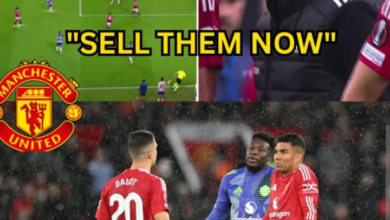
Football has long been a sport filled with passion, drama, and controversy, and once again, a major refereeing decision has ignited fierce debate. The controversial call to disallow Rayo Vallecano’s goal has polarized opinions, with many questioning whether this was a case of strict rule enforcement or yet another example of biased officiating that tends to favor football’s elite clubs. The aftermath of the decision has left fans, analysts, and players alike debating a fundamental question: was this the correct application of the rules, or was Rayo Vallecano unfairly stripped of a legitimate goal?
The contentious moment unfolded when Rayo Vallecano appeared to have taken the lead, only for their celebrations to be abruptly cut short. The referee ruled that the goal would not stand due to an alleged offside interference by Randy Nteka. According to the official explanation, Nteka, who was in an offside position at the time, obstructed Athletic Bilbao defender Iñigo Martínez from contesting the ball. However, this justification has sparked heated discussions—was Nteka’s presence truly impactful enough to warrant the goal being overturned, or was this decision influenced by external pressures?
Upon reviewing the footage, a strong argument can be made that Nteka’s involvement in the play was minimal at best. He did not make direct contact with Martínez, nor did he significantly hinder the defender’s ability to challenge for the ball. Given Martínez’s experience and defensive prowess, it is debatable whether Nteka’s positioning genuinely prevented him from making a play. If such a marginal situation is enough to disallow a goal, then football must ask itself: how many similar goals have been allowed to stand in the past, and how many should have been ruled out under the same criteria? The glaring inconsistency in officiating decisions remains a source of frustration for fans and teams alike.
This is where the controversy deepens. Had this incident occurred in favor of a more prestigious club, would the same call have been made? Time and again, football fans have witnessed decisions that appear to disproportionately benefit the sport’s powerhouses while less prominent teams, like Rayo Vallecano, find themselves on the losing end of such rulings. The perception that referees tend to protect bigger clubs is not a new one, but incidents like this only reinforce the belief that football is skewed in favor of the elite, leaving smaller teams to battle not only their opponents but also questionable officiating.
The introduction of the Video Assistant Referee (VAR) was meant to eradicate these types of controversies by ensuring that every decision is carefully reviewed and assessed with precision. However, in this case, VAR’s role has come under scrutiny. The decision to disallow the goal was made swiftly, raising concerns about whether the officials took the necessary time to properly analyze the situation. Instead of bringing clarity and fairness to the game, VAR has once again been accused of doing the opposite—serving as a tool that reinforces questionable calls rather than correcting them.
The frustration among Rayo Vallecano’s players was palpable, and their reaction was entirely understandable. They had every reason to feel aggrieved, as this decision could have been a turning point in the match. A goal at that moment might have shifted the momentum in their favor, potentially altering the entire outcome of the game. Instead, their hard-fought effort was dismissed in a matter of seconds, leaving them with a sense of injustice.
Fans, too, have taken to social media in droves, engaging in passionate debates over whether the referee’s call was justified. Many view this as yet another instance of inconsistency in football officiating, which erodes trust in the sport’s integrity. How can fans truly believe in the fairness of the game when decisions like these appear to disproportionately impact certain teams while benefiting others?
The official reasoning behind the call—that Nteka interfered with play—remains open to interpretation. Football, by nature, is a contact sport, and minor obstructions occur frequently without being penalized. If every instance of minimal interference were to be classified as an infraction, the number of disallowed goals would skyrocket, leading to even greater controversy. What frustrates fans the most is not just the ruling itself, but the apparent inconsistency in how these decisions are applied from match to match.
The lack of a clear and universally enforced standard for what constitutes interference in such cases only adds to the frustration. While some referees are more lenient and allow similar plays to continue, others are quick to penalize even the slightest obstruction. This inconsistency creates confusion and resentment among players, coaches, and supporters, who are left wondering why the same rule is interpreted differently depending on the game and the teams involved.
Although a handful of analysts have defended the decision by citing the letter of the law, football is not just about rigid rule enforcement—it is also about ensuring fairness. If the rules are being applied selectively, they lose their credibility. The same decision that cost Rayo Vallecano in this match might have been handled differently had a more high-profile club been involved, and that discrepancy is what fuels suspicions of favoritism.
Beyond this specific incident, the controversy also raises broader questions about refereeing standards and accountability. Are match officials receiving the proper training to interpret complex situations fairly? Are they influenced—whether consciously or subconsciously—by the reputation of certain clubs and the expectations placed upon them? If football’s governing bodies want to restore faith in the sport’s officiating, these concerns must be addressed with transparency and genuine reform.
For Rayo Vallecano, the implications of this decision could extend beyond just this one match. In a highly competitive league where every point matters, being denied a goal in such a questionable manner could have repercussions on their season. The psychological toll of feeling unfairly treated cannot be underestimated, as players may struggle to move past the disappointment of what they perceive as an unjust outcome.
As the discussion around this decision continues to intensify, one thing remains undeniable: football is in desperate need of more consistent officiating. Rules must be applied with fairness and uniformity, regardless of the stature of the teams involved. Until that happens, controversial calls like this will continue to divide opinions and fuel ongoing debates about potential biases in the sport.
So, was the referee’s call truly justified, or was Rayo Vallecano robbed of a goal that should have stood? The football community remains divided, but one thing is certain—this will not be the last time a refereeing decision ignites outrage and sparks debate over the integrity of the game.




